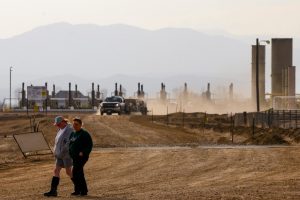
BERTHOUD, CO – MARCH 28: Stephanie Nilsen, left, and her partner Janis Butterfield walk down the road next to their small ranch, and in front of Extraction’s Trott Pad Thursday, March 28, 2019 in Berthoud, Colorado. Butterfield and Nilsen live about 1000 feet south of the oil and gas site which they claim has damaged their property and health. The state of Colorado is allowing some oil and gas well sites, including the Trott Pad, to pollute without obtaining the required air pollution permits. (Photo by Michael Ciaglo/Special to the Denver Post)
A report by the Denver Post claims Colorado public health officials have let oil and gas companies begin drilling and fracking operations at nearly 200 sites in the state without obtaining federally required permits limiting toxic pollution.
It is the result of a 27-year exemption that allows the companies to pollute for at least 90 days before obtaining the necessary paperwork.
Here is the story by the Post:
Colorado public health officials have let oil and gas companies begin drilling and fracking for fossil fuels at nearly 200 industrial sites across the state without first obtaining federally required permits that limit how much toxic pollution they can spew into the air.
Air pollution control officials at the Colorado Department of Public Health and Environment allow the industry to emit hundreds of tons of volatile organic chemicals, cancer-causing benzene and other pollutants using an exemption tucked into the state’s voluminous rules for the industry — rules that former Gov. John Hickenlooper, state leaders and industry officials long have hailed as the toughest in the nation.
They rely on this 27-year-old state exemption to give oil and gas companies 90 days to pollute, then assess what they need from Colorado regulators before applying for the air permits that set limits on emissions from industrial sites.
“It is a loophole that allows pollution at some of the times when the pollution is the most extreme,” said U.S. Rep. Diana DeGette, D-Denver, who chairs a congressional panel that oversees the Environmental Protection Agency.
Colorado’s practice may not be legal under the federal Clean Air Act. While oil and gas companies are required to install controls to minimize emissions during the 90-day window, state inspectors don’t check unless they receive specific complaints. State health officials told The Denver Post they have begun a review of whether the exemption complies with federal law. This comes as Gov. Jared Polis has signaled his intentions to try to improve Colorado’s deteriorating air quality.
Industry officials say they run their facilities to meet state health standards whether they are operating within the 90-day exemption period or have obtained permits — but need the flexibility to determine how much a site will pollute before limits are set.
Colorado air pollution permits typically set limits around 50 tons a year for volatile organic chemicals, state officials said, in addition to other toxic pollutants. No limits are set for methane, which accelerates global warming.
“The permitting requirements in Colorado are some of the most stringent in the United States, and having an appropriate amount of time to test and measure potential emissions from a production facility is important to ensure data integrity,” Anadarko Petroleum spokeswoman Allyson Manley said. “Air quality is impacted by many different sources in the DJ Basin, and reducing emissions from our operations has been and will continue to be a major focal point for us.”

Extraction Oil and Gas’ Enright pad sits off East State Highway 56 on Thursday, March 28, 2019, in Berthoud.
Nearly 200 sites in Colorado
Lawmakers who are working to re-focus oversight of Colorado’s multi-billion dollar fossil fuels industry failed to consider how state health officials grant oil and gas companies exemptions to pollute without limits, though DeGette and community groups are raising concerns.





